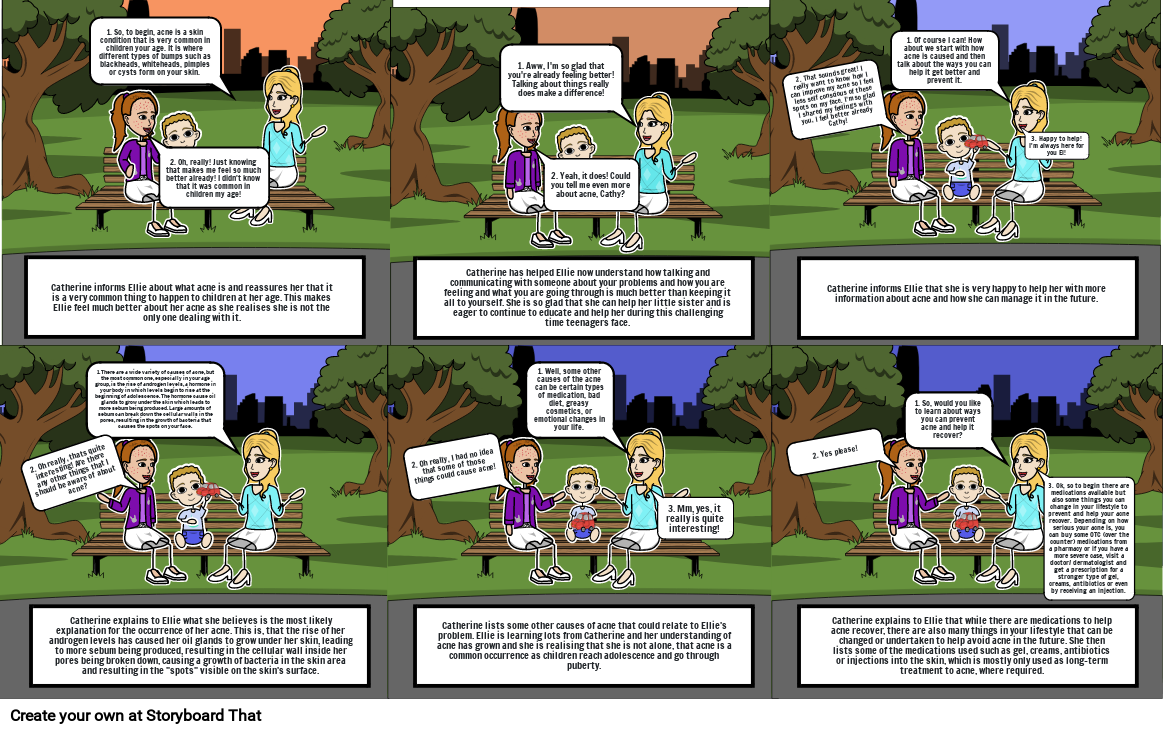Acne PDHPE Project

Storyboard Text
- Catherine informs Ellie about what acne is and reassures her that it is a very common thing to happen to children at her age. This makes Ellie feel much better about her acne as she realises she is not the only one dealing with it.
- 1. So, to begin, acne is a skin condition that is very common in children your age. It is where different types of bumps such as blackheads, whiteheads, pimples or cysts form on your skin.
- 2. Oh, really! Just knowing that makes me feel so much better already! I didn't know that it was common in children my age!
- Catherine has helped Ellie now understand how talking and communicating with someone about your problems and how you are feeling and what you are going through is much better than keeping it all to yourself. She is so glad that she can help her little sister and is eager to continue to educate and help her during this challenging time teenagers face.
- 1. Aww, I'm so glad that you're already feeling better! Talking about things really does make a difference!
- 2. Yeah, it does! Could you tell me even more about acne, Cathy?
- 2. That sounds great! I really want to know how I can improve my acne so I feel less self conscious of these spots on my face. I'm so glad I shared my feelings with you, I feel better already Cathy!
- Catherine informs Ellie that she is very happy to help her with more information about acne and how she can manage it in the future.
- 1. Of course I can! How about we start with how acne is caused and then talk about the ways you can help it get better and prevent it.
- 3. Happy to help! I'm always here for you El!
- 2. Oh really, thats quite interesting! Are there any other things that I should be aware of about acne?
- Catherine explains to Ellie what she believes is the most likely explanation for the occurrence of her acne. This is, that the rise of her androgen levels has caused her oil glands to grow under her skin, leading to more sebum being produced, resulting in the cellular wall inside her pores being broken down, causing a growth of bacteria in the skin area and resulting in the "spots" visible on the skin's surface.
- 1. There are a wide variety of causes of acne, but the most common one, especially in your age group, is the rise of androgen levels, a hormone in your body in which levels begin to rise at the beginning of adolescence. The hormone cause oil glands to grow under the skin which leads to more sebum being produced. Large amounts of sebum can break down the cellular walls in the pores, resulting in the growth of bacteria that causes the spots on your face.
- 2. Oh really, I had no idea that some of those things could cause acne!
- Catherine lists some other causes of acne that could relate to Ellie's problem. Ellie is learning lots from Catherine and her understanding of acne has grown and she is realising that she is not alone, that acne is a common occurrence as children reach adolescence and go through puberty.
- 1. Well, some other causes of the acne can be certain types of medication, bad diet, greasy cosmetics, or emotional changes in your life.
- 3. Mm, yes, it really is quite interesting!
- 2. Yes please!
- Catherine explains to Ellie that while there are medications to help acne recover, there are also many things in your lifestyle that can be changed or undertaken to help avoid acne in the future. She then lists some of the medications used such as gel, creams, antibiotics or injections into the skin, which is mostly only used as long-term treatment to acne, where required.
- 1. So, would you like to learn about ways you can prevent acne and help it recover?
- 3. Ok, so to begin there are medications available but also some things you can change in your lifestyle to prevent and help your acne recover. Depending on how serious your acne is, you can buy some OTC (over the counter) medications from a pharmacy or if you have a more severe case, visit a doctor/ dermatologist and get a prescription for a stronger type of gel, creams, antibiotics or even by receiving an injection.
Over 30 Million Storyboards Created

